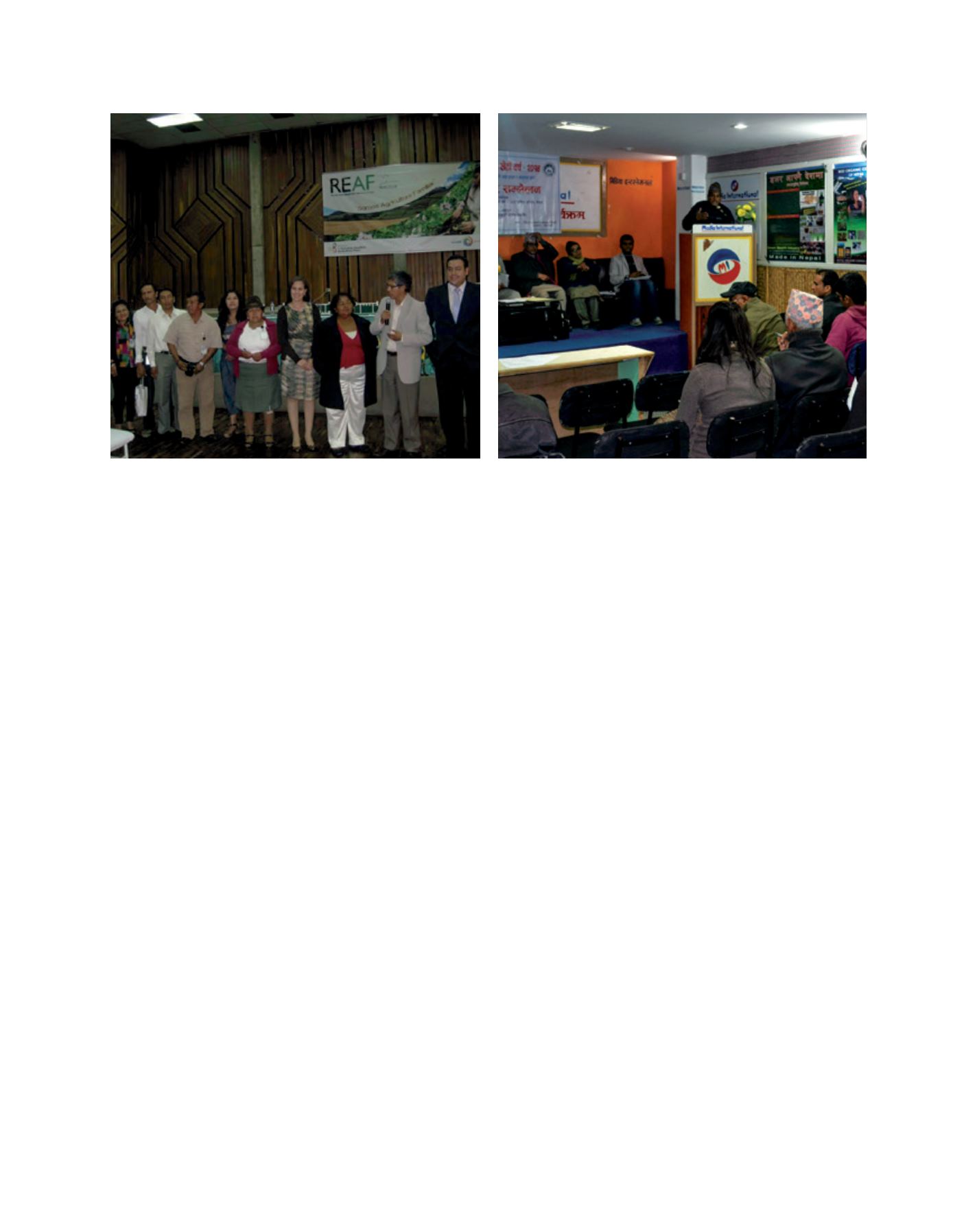

[
] 176
Images: World Rural Forum
Raising awareness: International Year of Family Farming 2014 national committee meetings in (left) Ecuador and (right) Nepal
Together with these achievements, numerous national
committees have already carried out studies and issued
reports focusing on the problems faced by rural areas, for
example in India, Nigeria, Burundi and Côte d’Ivoire. The
strengthening of knowledge concerning the broad range
of economic, social, political and environmental problems
confronting family farmers and restricting their rights to
deriving a decent livelihood from their work serves to help
orient policies in their favour.
Public awareness building
Numerous activities have focused on public opinion in order
to raise awareness about the importance of family farming,
the multiple functions it fulfils and the challenges it faces.
The national committees of Bolivia, Brazil, Burkina Faso,
Colombia, Costa Rica, Slovakia, Switzerland, Nepal, El
Salvador, Senegal, Mexico, New Zealand and Indonesia thus
organized or participated in numerous fairs, public fora or
festivals in their countries. Leisure activities such as exhi-
bitions or competitions themed on family farming were
organized in Canada, New Zealand, France and Mexico.
In Brazil, Uganda and Nepal among others, national
committees organized marches and rallies attended by several
hundred people. Awareness-raising materials (banners,
posters and T-shirts) were on show to give high visibility to
these social mobilization events.
Numerous media – newspapers, magazines, television
and radio – also contributed to broadening the visibility
of the International Year of Family Farming, as well as
national committee activities thus reaching and informing
a good part of the population. To achieve this, national
committees organized numerous press conferences so as
to brief the media about the international year, raising
their awareness about the reality and importance of family
farming so that they in turn could project a positive and
accurate image of it. This also enabled the creation of
professional communication networks for the announce-
ment of events throughout the year. Following press
conferences, articles were often published and sometimes
republished in the print media in, for example, Burkina
Faso, Burundi, Côte d’Ivoire, Spain, Belgium, Switzerland,
New Zealand, Gambia, Nepal, El Salvador, Guatemala,
Uruguay and Senegal.
Programmes and jingles related to family farming were
widely broadcast on radio, for example in Nepal, the
Democratic Republic of Congo, Uganda, France and Costa
Rica, while television features were filmed and frequently
shown in Spain, India, Nepal, Côte d’Ivoire, Burundi and the
Democratic Republic of Congo.
All these examples of activities are only the tip of
the iceberg of the impressive dynamism underlying the
International Year of Family Farming national committees.
As reported above, concrete political improvements emerged
during 2014, foreshadowing a much more optimistic future
for family farming in various countries. Due to this energy,
the global image of family farming is also being upgraded
everywhere and is attracting broadly based attention from
governments and the public.
However, much remains to be done in order to recognize
the true value of women and men family farmers as the
worthy ambassadors of food security and sovereignty. Many
awareness-raising and political advocacy actions are still
needed to permanently move away from certain paradigms
which clearly work against family farmers, whatever their
origin, specialization, income levels or holding size. In this
context, the International Year of Family Farming national
committees have proved to be the best assets to boost family
farming worldwide.
For more information on International Year of Family Farming
2014 and the declarations mentioned above, please consult:
www.familyfarmingcampaign.netD
eep
R
oots
















